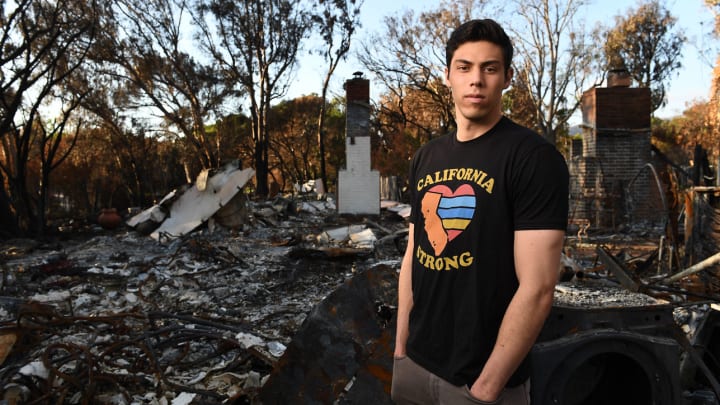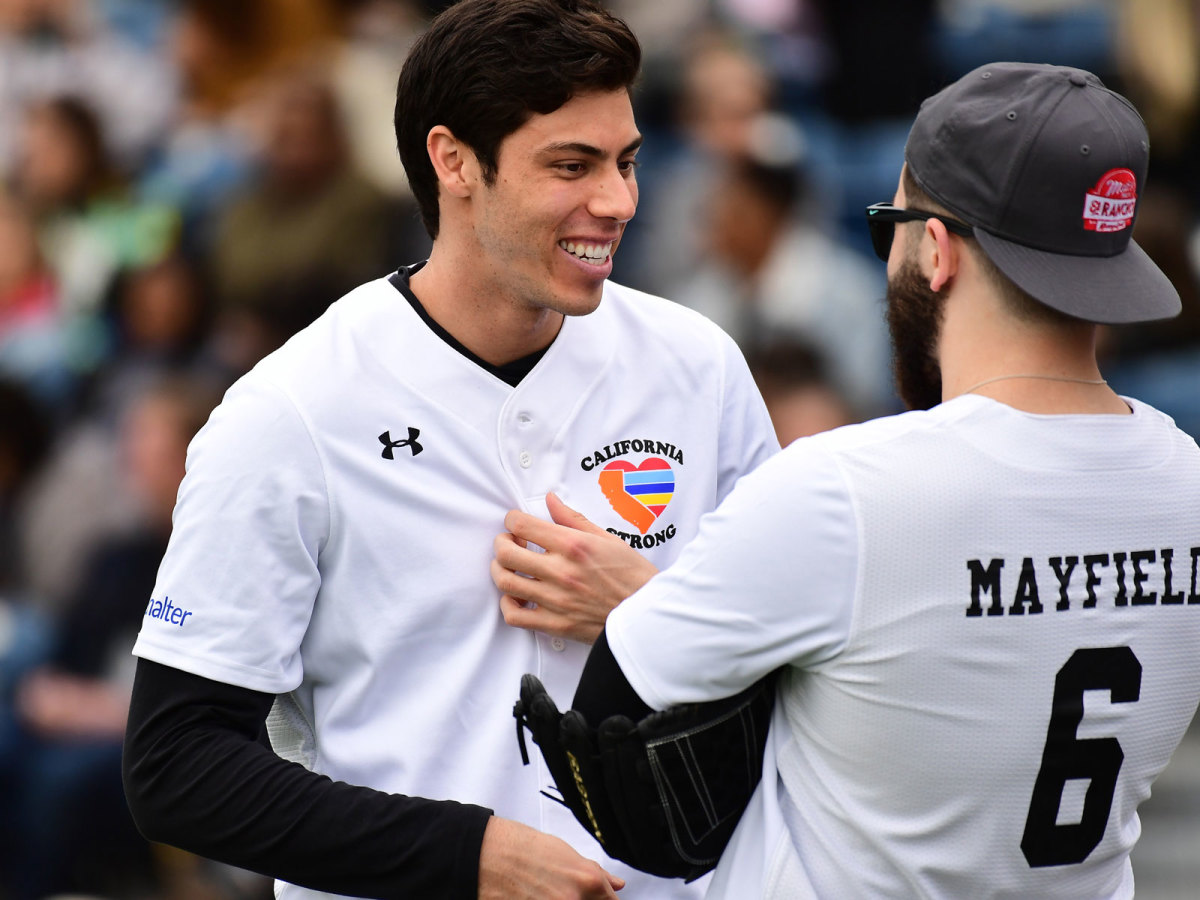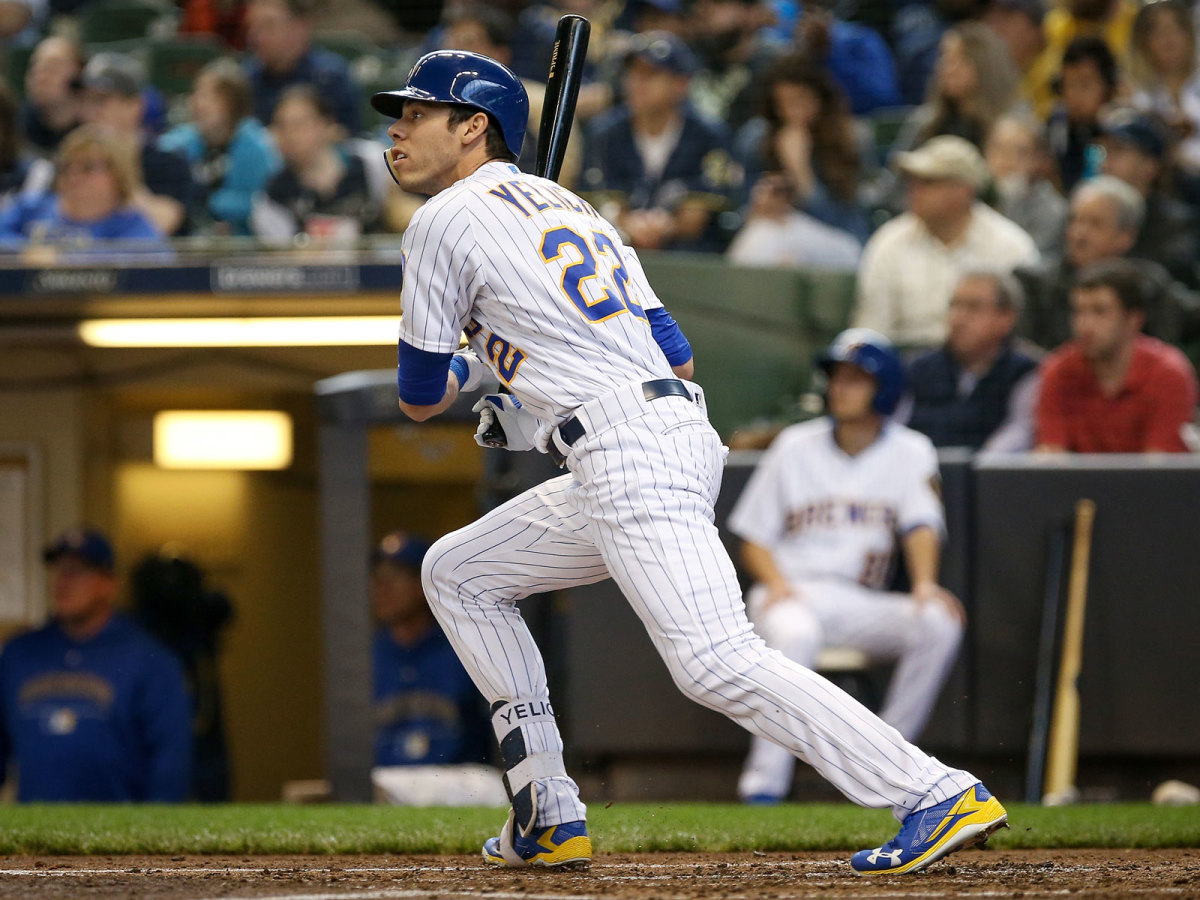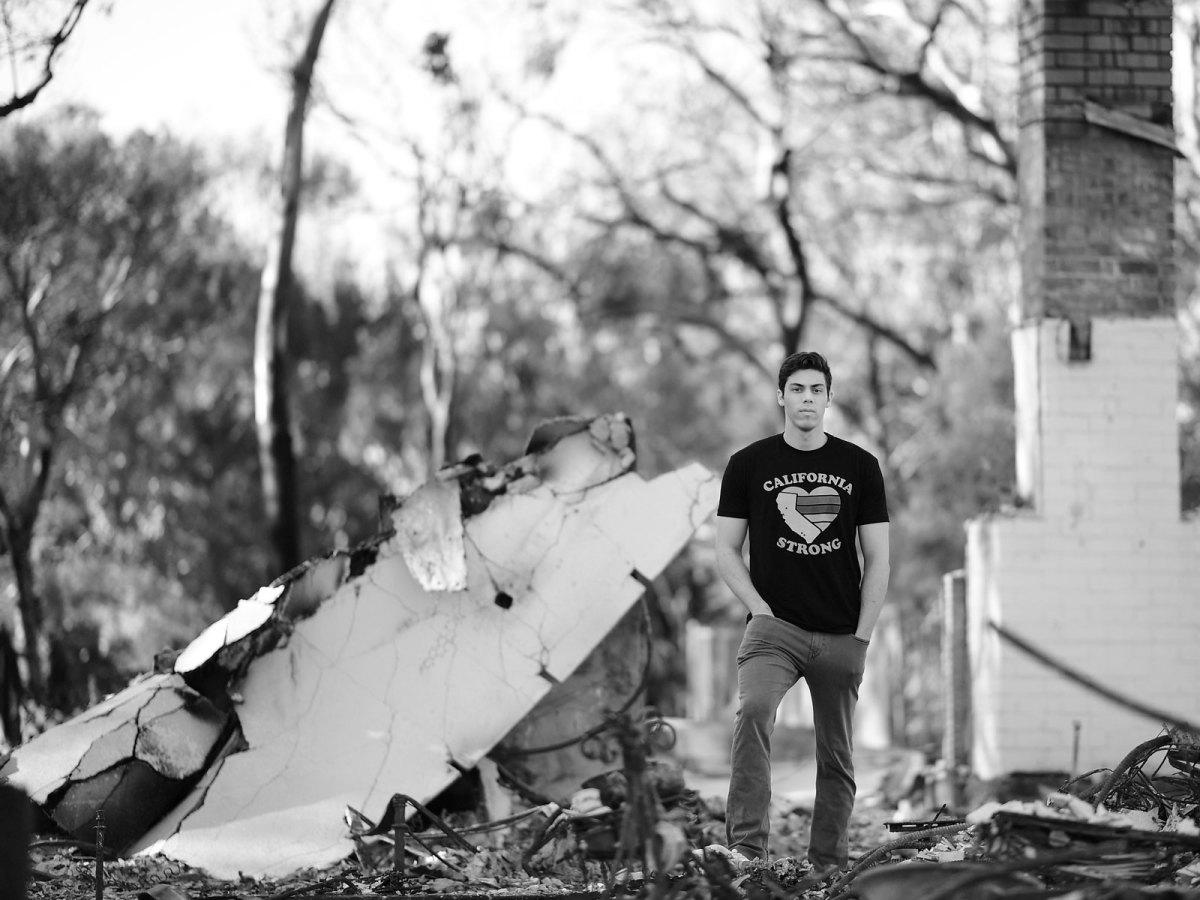First, Christian Yelich Helped California Heal From Fire. Then He Celebrated His MVP

This story appears in the Jan. 28, 2019, issue of Sports Illustrated. For more great storytelling and in-depth analysis, subscribe to the magazine—and get up to 94% off the cover price. Click here for more.
On Nov. 8, Christian Yelich decided to head over to his mother's house. It's a short drive from his home in Malibu to his hometown of Westlake Village—maybe half an hour inland on a good traffic day in Southern California—and he has been making some variation of the trip for most of his life.
When Yelich was a boy, his mother, Alecia, would bring him and his two younger brothers to Malibu's public beaches. In 2017, after his fifth season in the major leagues, he tried spending the winter there, to see if he would love it as much as he had as a kid. He did. In 2018 he bought a three-bedroom beachfront house, where he lives alone. Right on the Pacific Coast Highway, the house is tucked into a quiet stretch of cliffside, its view near absurdly picture-perfect, like a movie set viewed through a filter on Instagram, all flawless views and flattering light.
"It's kind of isolated," says the soft-spoken Yelich, seated at his kitchen table, the Pacific framed behind him by sliding glass patio doors. "You can get away from the craziness—the stress, the pressure, everything that goes into a baseball season. Once it's over, you can just fall off the map here for a little while."
That's what the Brewers' leftfielder was trying to do in early November. Milwaukee had come painfully close to a trip to the World Series—losing to the Dodgers in Game 7 of the NL Championship Series, not even three weeks earlier—and he was ready to slide into the rhythms of the offseason. There would be a morning workout after breakfast. (He has never been much of a breakfast eater, and he still doesn't like that meal's food, but he knows, at age 27, that he'll feel worse during the day if he doesn't have at least a peanut butter sandwich.) Then, the bliss of a free afternoon. The evening would be for family or childhood friends, most of whom are still clustered in this same area. This is the routine that he had begun to settle into when he saw the news of a wildfire the next county over.
Earlier that morning a fire had broken out around 500 miles to the north, destroying the town of Paradise. But this fire didn't seem as serious; there hadn't been an evacuation order issued or anything to cause alarm. But Yelich thought that he'd go see his mom, just in case. If the fire spread, he'd be around to help, and if it didn't, well, he'd just enjoy time with her. She was busy at work, in her job as a real estate agent, and he sent a text to let her know: There's a fire.
"I was like, 'Well, O.K., I'll be home in a little bit!'" Alecia recalls. It was only later, when she stepped outside, that she smelled this was serious—not just a fire, but a bad one, and coming closer. She hurried back home.
"Obviously, a few hours later, all hell broke loose," Christian says.
He considers himself lucky to have left his home as early as he did. The next day, Malibu was under a mandatory evacuation. The Woolsey Fire ravaged swaths of the city, leaving acres of the stunning landscape scorched. Two people burned to death on the highway while trying to escape.
"If you go down that way," Yelich says now, two months later, throwing out his left arm to gesture through his kitchen, "it's gone. Gone—houses, everything, nothing exists there anymore. It's all black."
His own house didn't suffer any damage; nor did Alecia's. But in those early days, nothing was certain. Yelich wasn't able to return home for more than two weeks. Even when the immediate threat seemed to be over, the Woolsey Fire burned on. (It wouldn't be fully contained until Nov. 21.) Meanwhile, the community was reeling from a separate tragedy. On the night before the fire had begun to spread, 12 people had been shot and killed, as well as the gunman, at the Borderline Bar and Grill in nearby Thousand Oaks. While he knew none of the victims, the restaurant was just four miles up the street from Westlake High, and Yelich had gone there when he was younger.

In the middle of all that catastrophe—when the area where he'd been born and raised, and made home as an adult, was split and cracked along twin fault lines of calamity, was something less agonizing: Major League Baseball's MVP announcements.
Yelich's status as a finalist for the NL award, which was presented on Nov. 15, wasn't exactly a surprise. He had led the league in batting average (.326), slugging percentage (.598) and OPS (a perfectly round 1.000), with 36 homers, 110 RBIs and 22 steals. His performance over the last few months of the season had been the stuff of legend. (Just 11 players have ever had a higher OPS+ in the second half of a season; 10 are in the Hall of Fame, and one is Barry Bonds.) As the announcement drew nearer, however, Yelich didn't know quite what to do. It's customary for finalists to appear live on MLB Network—typically shown in their homes, surrounded by family and friends. But Yelich didn't know what was logistically possible, let alone about preparing for a potential celebration under such circumstances.
"We weren't sure if we should have people over, or what the plan was," Alecia says.
The morning before the announcement Christian and Alecia decided they would spend the next day as they might have under happier times. As she scrambled to arrange for food, he invited over family and friends—including teammates Ryan Braun and Mike Moustakas, Southern California natives who had also been evacuated, and Browns quarterback Baker Mayfield, whom Yelich befriended last winter when the two trained at the same gym in Westlake.
An MVP doesn't get any advance notice. He finds out that he's won when everyone else does, on live television. Yelich remembers putting in the earpiece for an interview after hearing he had been chosen, but he doesn't recall any of the studio's questions or any of his answers. Instead, he remembers thinking about the people in the room.
"I think it was just nice for everybody to have some good news," he says. "For a little while."
***
Of course, Yelich's entire whirlwind season—his first playoff run, his first All-Star Game appearance and home run, his first MVP—began with his trade from Miami to Milwaukee. And that began with looking for his phone.
He had been holding it, what, half an hour earlier? It was the afternoon of Jan. 25, 2018, and he was at his Malibu home, grappling with the mundane annoyance of absolute certainty that a misplaced object is somewhere without any awareness of where it actually is. Yelich didn't have anywhere to be, but he still felt a creeping sense of urgency. He had been with the Marlins his entire career—they had drafted him in the first round of '10, scarcely six months after his 18th birthday—but they were under new ownership, and his winter had been full of trade rumors. Fellow outfielders Giancarlo Stanton and Marcell Ozuna had left in separate deals more than a month ago. Yelich figured that his phone might be ringing soon, and he'd like to be able to answer when it did.
WERTHEIM: The Truth Behind Nick Francona, Gabe Kapler and a Mishandled Sexual Assault Charge
After scouring the house he found it—with a screen full of notifications. He saw texts, missed calls and a voicemail from his agent; a set of the same from Marlins president of baseball operations Michael Hill; and a third group, from a number that he didn't recognize. He had been traded, he knew, and the mystery caller had to be the general manager of his new team.
He was right: The third voicemail was from Milwaukee GM David Stearns. When he returned the call, Yelich was told the team might have some more exciting news to share, and later that evening the proof came rolling through on a fresh set of digital notifications. (At this point he was making sure to keep his phone securely in hand.) Immediately after acquiring Yelich, the Brewers signed outfielder Lorenzo Cain. They didn't want to build for the future. They wanted to win now.

"It was basically opposite ends of the spectrum," Yelich says. In his five seasons in Miami the team never had a winning season or finished within a dozen games of first place. The Brewers, meanwhile, coming off a surprising 86-win season in 2017, were in the process of beefing up their lineup—and were expecting to get crucial support from Yelich.
They did, and they got more than anyone could have reasonably foreseen. Yelich had always been good, of course. Even at his worst—2015, when he was hampered by a back injury—he was still solidly above average at the plate and in the field. At his best, though, he had never approached what he accomplished in '18. "The first time that I got to see him take batting practice last spring training, I just thought that he had the ability, if things clicked right, to hit for more power than he had at that time in his career," says Braun. "He's just such a well-rounded player. He's a great defender, he's a great baserunner, he works walks, his on-base percentage is always going to be a strength—I think power was kind of that last tool to develop, and the first time I saw him take batting practice, I certainly thought it was a possibility."
There was no single catalyst for his transformation, Yelich says—no dramatic swing change, no breakthrough session with a hitting guru, no illuminating statistic on a spreadsheet. Instead, there was a litany of tweaks; there were factors that he can explain, and others that he can't. For one thing, Miller Park is far more hitter-friendly than Marlins Park. (He hit 22 of his 36 homers at home.) For another, he became more aggressive on first pitches, having grown more secure in his knowledge of his strengths and weaknesses at the plate. As for the second half of the season, when he hit more home runs (25) than he had in an entire year, with an utterly insane 1.219 OPS? Says Yelich, "You kind of started laughing at it after a little while, just because of how crazy it got. I don't know."
These are the factors he cites to explain his breakthrough. And with even more conviction, he refuses to cite another. "Everyone wants to point towards launch angle," Yelich says. "I hate that conversation so much."
Before last year Yelich seemed like the poster boy for players who stood to benefit from baseball's fly-ball revolution. His 59.1% career groundball rate was among the highest in the majors. If Yelich could get the ball in the air a little bit more, the thinking went, he'd reach his full potential as a hitter. This mind-set came alongside the rise of MLB's Statcast, which zeroed in on launch angle—which measures the trajectory of the ball off the hitter's bat. Yelich, unsurprisingly, tended to rank among the league's lowest.
VERDUCCI: Should Bryce Harper Sign With a Rebuilding Team Like the Padres?
For all that did change last season for Yelich, his launch angle didn't. His 2018 number was exactly the same as it had been in '17, down to the decimal: 4.7°. Despite this, during his torrid second half one of every two balls Yelich hit in the air was a home run—quadruple the rate of a typical hitter. He wasn't lifting the ball more often; he was just getting far better results when he did.
It seems only natural that he's a little skeptical of launch angle, then—not the metric itself, but how it's often applied. It can be part of the modern conversation on hitting, he argues, but it can't be the conversation. He doesn't think that every player's swing can be easily retooled to achieve more loft, and as more front offices seem to pursue the fly ball, he believes there will be diminishing returns for many hitters.
"If you hit a routine fly ball in the big leagues, you're out every time," Yelich says. "If you hit a ground ball, you're probably out a lot of the time as well. But there's a happy medium in there, a way to swing where your misses can still lead to successes. Now, all these guys have these launch angle swings—that's why there were more strikeouts this year than there were hits for the first time ever. Pitching's adjusted. It's this whole deal, and I never really bought into it."

***
As the fires burned, Yelich got on a group text with Braun and Moustakas. They weren't sure how much damage there might ultimately be, but they knew that they wanted to do something. "When we knew that, structurally, our houses were O.K., the conversation immediately turned to, 'How can we help?'" says Braun. "We recognized pretty quickly the magnitude and scope of how significant the damage was going to be."
Says Yelich, "We're in a position to do it. It's our community, and we felt a responsibility to help and give back." With Rams quarterback Jared Goff they began a campaign called California Strong. With an auction and a celebrity softball game they have already raised more than $1 million, and the quartet's hope is to keep the charity work going, even as mainstream focus on the destruction begins to fade. "It gets so much publicity, then there's something else and it gets forgotten," Yelich says. "People's lives still have to go on."
The work has kept the group busier than they had expected—Yelich says managing the logistics of the softball game alone has given him an entirely new appreciation for event planners—but it's been fulfilling. Meanwhile, spring training is approaching. The Brewers are poised to contend again, and Yelich's 2018 success hasn't done anything to lessen the pressure that he'll put on himself for 2019. If anything, it's the opposite. This has always been his approach, he says. In a new level of accomplishment, there's a new level of work.
"I don't want to let complacency kick in," Yelich says. "Once you've had success, I think you can go one of two ways. You can either have that success and go downhill, or you can use it to build off of it and continue going upward."
This means that he didn't have an I've made it moment when he got the call to the big leagues, and even now, Yelich still isn't sure that he's had an I've made it moment. "Well, maybe this year?" Alecia gently suggests.
The MVP relents a little. Maybe this year.
